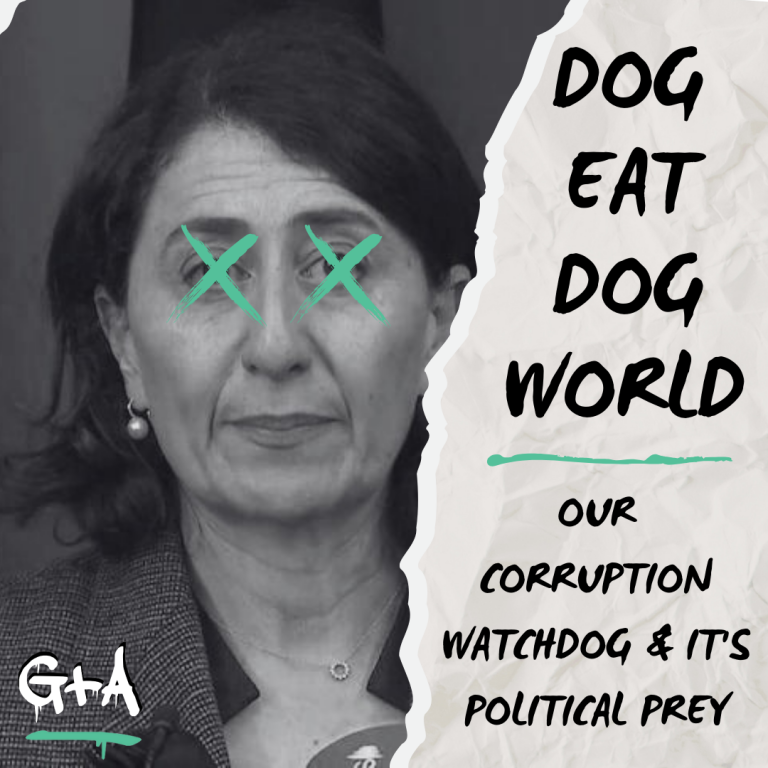Unless you have been living under a rock, you would know that former NSW Premier, Gladys Berejiklian, resigned in the middle of the COVID-19 pandemic, which is arguably the most difficult time in the State’s recent history. This news may have been a shock to many, but it seems Gladys’ decision to step down as premier was a long time coming.
For some time now, there were rumours that ICAC – The Independent Commission Against Corruption was investigating Berejiklian’s movements between 2012 and 2018, and specifically, whether her “close personal relationship” with Wagga Wagga MP Daryl Maguire had any influence on the awarding of a $10m grant to the Australian Clay Target Association in 2016-17, and the awarding of a $20m grant to the Riverina Conservatorium of Music in Wagga Wagga in 2018.
Shortly after the publication of the ICAC investigation involving Gladys – dubbed ‘Operation Keppel’ – the former premier held a press conference at 1pm on 1 October 2021, denying allegations of her misconduct yet announcing her resignation to the public. ICAC has stated they will be investigating whether Ms Berejiklian engaged in conduct that ‘involved the dishonest exercise of any of her official functions’ or if she failed to ‘exercise her duty to report any matter she suspected may concern corrupt conduct’.
Why does ICAC care? As mentioned above, ICAC is The Independent Commission Against Corruption. Since its inception in 1988, it functions as an independent organisation to protect the public interest, prevent breaches of public trust and guide the conduct of public officials in the NSW public sector. ICAC’s independence is crucial to uphold legitimacy and public confidence and to ensure the Parliament operate as intended and there’s no dodgy business.
ICAC is provided special powers under the ICAC Act (Independent Commission Against Corruption Act 1988 (NSW)).
One of those powers includes the ability to conduct investigations and equiries. If, following that process, there are findings and evidence sufficient enough to warrant further action, ICAC can then pass this onto the Office of the Director of Public Prosecutions to decide whether to prosecute the individuals who are under investigation.
In light of recent developments with Gladys Berejiklian, we thought we could take a trip down memory lane to detail some of the major politicians who have fallen prey to ICAC.
The first high-profile politician we remember to be in the cross hairs of ICAC was the then-NSW Premier, Nick Greiner, who was alleged to have eliminated his political opposition, Terry Metherell, by giving him an offer he could not refuse – a lucrative public service job in the Department of Environment. This allowed Greiner to win back the seat of Davidson on Sydney’s North Shore. Greiner was later found not guilty of any wrongdoing in the Court of Appeal with a 2-1 vote in his favour.
Next up was former NSW premier, Barry O’Farrell who also resigned from the premier position amidst an ICAC investigation. The story is that O’Farrell accepted a $3,000 bottle of Penfolds Grange as a gift from Nick Di Girolamo, who was the CEO of Australia Water Holdings (AWH). It was alleged that AWH lobbied O’Farrell to help secure a deal with state-owned Sydney Water Holdings. Although lobbying is not necessarily illegal, it sends the wrong message to the public when extravagant gifts are not declared – which is exactly what happened in the case of the Grange. O’Farrell failed to declare the bottle of wine from Di Girolamo, suggesting there may have been sneaky business deals being struck. O’Farrell is on record stating that he did not remember ever receiving the bottle of wine, but was caught out when Di Girolamo produced a hand-written note from O’Farrell thanking him for the gift. The ICAC operation dubbed ‘Operation Credo’ made no findings against O’Farrell or Di Girolamo but the then-premier did have to step down from his position in the circumstances.
Although ‘Operation Credo’ hasn’t forced any NSW Labor premiers into an early resignation, it has provided overwhelming evidence that led to the jailing of former MP Eddie Obeid and Ian Macdonald, in 2016 and 2017. Eddie was sentenced to 5 years’ imprisonment for misconduct in public office over his family’s secret cafe leases at Circular Quay. He was later released on parole after 3 years, in 2019. Ian Macdonald was sentenced to 10 years’ imprisonment (7 years non-parole), also for misconduct in public office for corruptly issuing lucrative mining licences at Doyles Creek in the Hunter Valley. He was later released as his conviction was dropped under a retrial order. Both men and Eddie Obeid’s son, Moses, are still awaiting the final outcome of their appeal and retrial.




